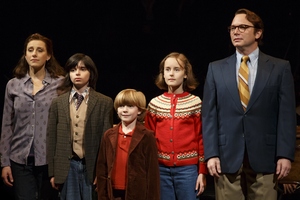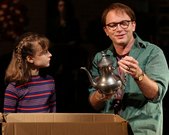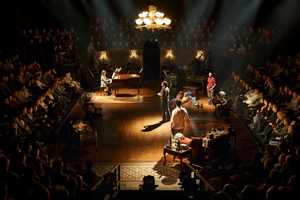Search Curtainup
SITE GUIDE
REVIEWS
REVIEW ARCHIVES
ADVERTISING AT CURTAINUP
FEATURES
NEWS
Broadway
Off-Broadway
NYC Restaurants
BOOKS and CDs
OTHER PLACES
Berkshires
London
California
New Jersey
DC
Philadelphia
Elsewhere
QUOTES
TKTS
PLAYWRIGHTS' ALBUMS
LETTERS TO EDITOR
FILM
LINKS
MISCELLANEOUS
Free Updates
Masthead
A CurtainUp Review
Fun Home
By Elyse Sommer
|
Welcome to our house on Maple Avenue See how we polish and we shine We rearrange and realign Everything is balanced and serene Like chaos never happens if it's never seen — Allison |

L-R: Judy Kuhn, Oscar Williams, Zell Steele Morrow, Sydney Lucas, and Michael Cerveris (Photo credit: Joan Marcus)
|

Sydney Lucas and Michael Cerveris (Photo credit: Joan Marcus)
|
It may not offer a laugh a minute like Something Rotten! or exquisite ballet dancing like An American in Paris, but its combination of a unique story with fully dimensioned characters and a haunting score brings in a big breath of fresh air to Broadway. In a best of all possible worlds it would win several Tonys, including Best New Musical. But whether it wins or not, just making the move uptown is a welcome broadening of what's been on offer.
To get right to the good news. Fun Home had me as much in its grip now as it did two years ago.
The show stands on its own without reading Alison Bechdel's graphic memoir on which it is based. However, I did read it before seeing this new production, and that reading deepened my appreciation for the effectiveness of composer Jenine Tesori and librettist/lyricist Lisa Kron's inspired page to stage adaptation. It also clarifies the time frame that's neither in the show's program or referenced in the dialogue (1969-1980) — a time when there were many Bruces living a pretend "normal" life. (here's a link to the book at Amazon-- where you can buy it and also sample the contents: http://www.amazon.com/Fun-Home-Tragicomic-Alison-Bechdel-ebook/dp/B00DYEC8MC/ref=sr_1_1?s=digital-text&ie=UTF8&qid=1427464168&sr=1-1&keywords=Fun+Home)
Bechdel, a Lesbian artist, used the book to reflect on her growing up in Beech Creek, Pa, the middle child and only girl in a family in which true feelings were never open for discussion. In her father Bruce's case that meant his being Gay was sublimated by obsessively fixing up the family home into a museum or "fun home." The Bechdel kids also grew up around another "fun home"— the funeral home that Bruce manages when not antiquing, renovating or teaching English at the town's high school.
Not an easy story to translate into a play, let alone a musical. But the Kron/ Tesori device for bringing this both funny and painful story to the stage is remarkably effective: They created three Alisons to make sense of a seemingly average small town family, whose unresolved and never talked about dysfunction is the result of a brilliant, complex father's obsessive-compulsive behavior.
The 43-year-old Alison (Beth Malone) is a stand-in for the graphic artist Alison Bechdel. For Bechdel these travels into the recesses of her mind were springboards for her book's images and captions. In the show that journey turns her into a one-person Greek-Chorus/Narrator.
As the narrating Alison's memories become concrete we meet the rest of the Bechdel family. Most were fortunately available to reprise their bravura performances: Mother and father Bruce (Michael Cerveris and Judy Kuhn). . . brothers Christian and John (adorable and talented new cast additions, Zell Morrow and Oscar Williams) . . . a "small" or 8-year-old Alison (Sydney Lucas) and a "medium" or 19-year-old Alison (Emily Skeggs, who ably replaced Alexandra Socha as the Public production kept extending).
Bruce, the stubbornly impenetrable father, is the dominating figure. Michael Cerveris, an always superb performer, outdoes himself with his portrayal of someone who seems to enjoy his children and family life but is also a demanding and controlling tyrant. Most tellingly he captures the man's denial that extends to his actually convincing himself that the surface picture of the Bechdel family is the real thing. Watching him pour all his suppressed passion into the house that's his true love, I was once again struck by they way Cerveris, though at first almost unrecognizable in a neat wig, captures this inconsistently fun and affectionate father. This begins with a scene in which he lifts up little Alison in a game of airplane, but quickly loses interest and unceremoniously drops her while she's eager to continue the game. His imposing his wishes and interests on the family is more potently evident than ever when he enlists everyone to make the spectacular house even more so for a visit from a woman who is interested in making it part of a house tour.

The Cast surrounded by audience at Circle In The square(Photo credit: Joan Marcus)
|
The scenes not being in chronological order enhances rather than confuses. Nothing is lost by dropping the projections that were in the original production and a big Wow! factor is added to the visual story telling by the way set pieces appear and disappear elevator style from the stage floor. The six-piece orchestra, again with Chris Fenwick conducting and at the keyboards, cleverly puts the musicians right into the set at one of the narrow end sections. If there's one down side to the in-the-round rather than proscenium setting, it's that you miss the actors' facial expressions some of the time in order for them to play to all four sides.
Tesori's songs are even more impressive on second hearing. They're melodic but more geared to evoking moods than humming and foot tapping. Those moods are both happy and dark. All are tightly integrated into Lisa Kron's script, which probably accounts for the absence of a song list in the program as is usually the case for operas and sung-through musicals. (a list of the songs is included at the end of the production notes below).
Kron's lyrics rhyme naturally and smartly support the story. "Come to the "Fun Home" neatly sums up the essence of how this family functions or rather dysfunctions. ("See how we polish and we shine/We rearrange and realign/ Everything is balanced and serene/Like chaos never happens if it's never seen").
There are opportunities for every cast member to add texture and lightness as in the wonderful scene when the Bechdel kids are made assistants in the funeral home. While this does include a creepy moment it also features a hilarious Jackson Five style commercial for this their second fun home ("We take dead bodies ev'ry day of the week so/You've got no reason to roam/Use the Bechdel Funeral Home").
While this is the latest of many Broadway star turns for Cerveris, this is an all-star cast — from Beth Malone with her butch haircut to Joel Perez in several roles, and Roberta Calindrez's Joan who prompts Middle Alison's (Skeggs) "Í'm Changing My Major to Joan."
Given that she's still a pre-teen, Sydney Lucas's Young Alison is especially remarkable. She's grown literally and figuratively, since first collecting an Obie for the role.
Judy Kuhn was faced with staying with Fun Home or another Broadway transfer, The Visit. Luckily for the show she opted to stay on as Bruce's unhappy wife Helen. It's not a big role but its impact is major. The accumulation of her unexpressed feelings are most devastatingly on display in a scene where Bruce brings Roy (Perez) home ostensibly to help with the yard work. She looks at them knowingly but, as she's done for all the years of her marriage, says nothing. Instead we see a triptych of images: Bruce and Roy. . .the kids watching TV. . . and Helen at the grand piano in a ballad that's a heartbreaking recap of all the years of her marriage ("Days made of bargains I made because I thought as a wife/I was meant to. . .")
Ben Stanton's lighting lends shading to the scenery changes by David Zinn, who does double duty as costume designer (most notably for Ceveris's Bruce). Alison's journey is not the stuff associated with mass appeal Broadway shows. However, the packed house at the performance I attended indicated that there are enough open-minded, adventurous musical theater lovers to make Fun Home the hit it deserves to be.
|
Fun Home Music by Jeanine Tesori Book and Lyrics by Lisa Kron based on the Alison Bechdel book Directed by Sam Gold Cast: Michael Cerveris(Bruce),Roberta Colindrez (Joan),Judy Kuhn (Helen),Sydney Lucas (Small Allison), Beth Malone (Allison), Joel Perez (Roy and other), Emily Skeggs (Medium Allison), Zell Morrow and Oscar Williams (Brothers Christian and John) Sets and costumes: David Zinn Lighting: Ben Stanton Sound: Kai Harada Wig design: Paul Huntley Music directOR: Chris Fenwick Choreography: Danny Mefford Orchestrations: John Clancy Stage Manager: Lisa Dawn Cave Running Time: Approx. 1 hour and 40 minutes, without intermission Circle in the Square, West 50th Street From 3/27/15; opening 4/19/15 Reviewed by Elyse Sommer at April 28th press matinee The show announce that would close 9/10/16 after 18 months, but there will be a road show. Songs It All Comes Back (Opening) Welcome to Our House on Maple Avenue Come to the Fun Home Helen's Etude Party Dress Changing My Major Raincoat of Love Pony Girl Ring of Keys Days and Days Telephone Wire Edges of the World Flying Away (Finale) |
|
REVIEW FEEDBACK Highlight one of the responses below and click "copy" or"CTRL+C"
Paste the highlighted text into the subject line (CTRL+ V): Feel free to add detailed comments in the body of the email. . .also the names and emails of any friends to whom you'd like us to forward a copy of this review. For a feed to reviews and features as they are posted add http://curtainupnewlinks.blogspot.com to your reader Curtainup at Facebook . . . Curtainup at Twitter Subscribe to our FREE email updates: E-mail: esommer@curtainup.comesommer@curtainup.com put SUBSCRIBE CURTAINUP EMAIL UPDATE in the subject line and your full name and email address in the body of the message. If you can spare a minute, tell us how you came to CurtainUp and from what part of the country. |

|


 Book of Mormon -CD
Book of Mormon -CD